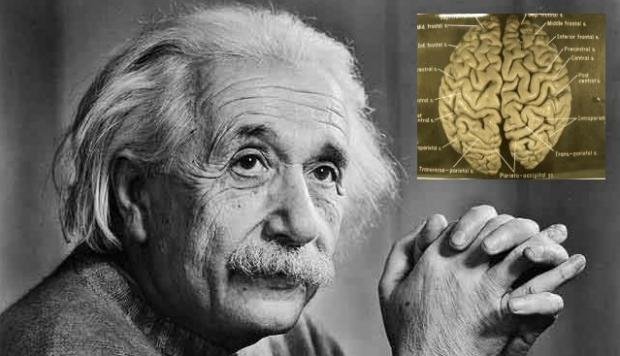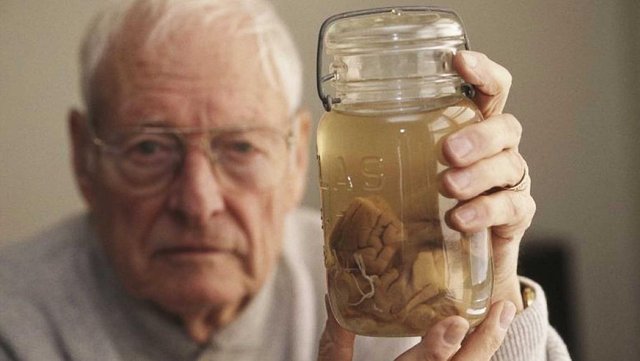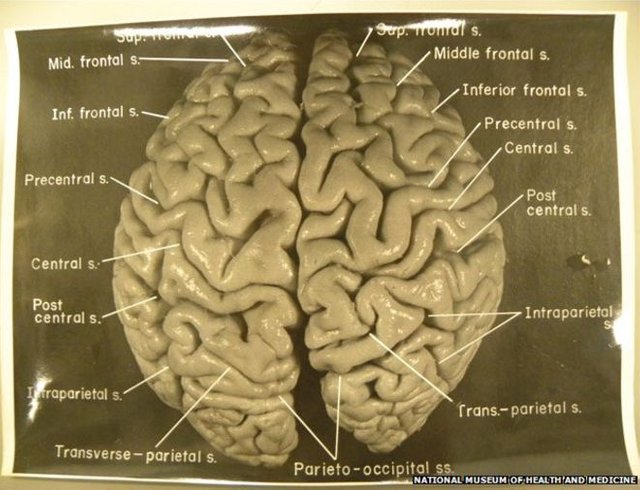The History Of Albert Einstein's Brain After His Death
The pathologist Thomas Harvey stole the brain of Albert Einstein, after his autopsy in 1955. After that, a whole story was opened halfway between the truculent and scientific curiosity. There were many who longed to know was the secret of his genius, others did not see with good eyes that usurpation. Either way, the results of the analysis were more than revealing.
The truth is that few accounts of our scientific historical fabric are as disturbing as they are fascinating at the same time. There is something tragic in this story, without a doubt but it also illustrates that singular desire of the human being to know himself. To know what ins and outs are hidden in those brains that are capable of changing the world in some aspect, powerful in making us discover exceptional things.
"Every day we know more and we understand less"
-Albert Einstein-
The father of relativity was one of them. However, Albert Einstein was also something else: an icon, a media figure and of great social impact. He knew it well, and aware of it he gave very precise guidelines about what he wanted for himself after his death. Discretion and privacy He wanted to be incinerated and his ashes to be scattered in a river. After all this, his death could be announced to the media.
However, something failed. Nobody had an unforeseen and almost unimaginable factor: Thomas Harvey. This pathologist was made with the brain of Albert Einstein after his autopsy. Finally it happened what the charismatic physicist never wanted: to become a revered relic.
The man who wanted Einstein's brain
In this story, coincidence and opportunity intermingled. Einstein died at age 76, on April 18, 1955 after the rupture of an abdominal aortic aneurysm. A few days later, the incineration was proceeded. Now, just when the family expected to see the death of Albert Einstein published in the media, they were surprised to read something very different. The New York Times reported that the brain of the nuclear physicist had been removed from the body for study.
The one responsible for all this was a pathologist, Dr. Thomas Harvey. It is said of him that he was a great admirer of Einstein. Also that his character oscillated between the imbalance, the most elusive introversion and the obsessive meticulousness by science. Surely, the one who was responsible for the autopsy of Einstein was a luck for him. An opportunity that did not miss out.
The autopsy and a basement
He extracted Albert Einstein's brain with great care, weighed it, dissected it and put it in several jars. Then he put it safely in the basement of his house. He was not a neurologist, so his goal was as simple as it was ambitious. I wanted to bring together the best specialists in the world to study in detail each area of
that brain, each fragment, each cell. His goal was to publish the results as soon as possible in the most prestigious magazines and acquire world fame.
Now, all those anxieties and aspirations of Dr. Harvey were truncated. The first thing that happened was obvious: he lost his job. He was criticized and punished harshly by the scientific community. His promising career at Princeton was frustrated. And his wife left him. His action and the scary fact of keeping a brain hidden in a basement did not seem logical or even less pleasant.
However, curious as it may be, the only encouragement he had to move forward with his company came from Hans Albert, the son of Einstein. Thus, and although at first he was affected and outraged, he later concluded with something that in his opinion, had its logic. Einstein always advocated scientific advancement.
If the analysis of that brain would serve as something for the scientific community, the family gave its approval. The work of Thomas Harvey could go on.
The results about Albert Einstein's brain study
The results of the analysis of the brain of Albert Einstein went happening between 1975 to the present time. After Hans Albert's permission the panorama for Harvey changed. He was inundated with calls, interviews and moments, even fame. The journalists camped in his garden. Science magazine was in touch with him, as well as the best neuroanatomists in the world.
The 240 blocks and 12 sets of 200 slides that Harvey had created by dividing Albert Einstein's brain began to pay off.
What was behind the most desired brain in the world
The first thing that caught the attention of Albert Einstein's brain was its size. It was smaller than usual.
- In 1985, the University of California, Berkeley, published its results. The samples were on glial cells. These brain bodies act as support for neurons and participate in the brain's processing of information. And what did the studies reveal? That Albert Einstein had a lower number of glial cells, but they were larger.
- In 1996, the University of Alabama (Birmingham) published a paper on the prefrontal cortex of Einstein. They discovered that that part of the brain responsible for spatial cognition and mathematical thinking was more developed.
- In 2012, anthropologist Dean Falk studied photos of Albert Einstein's brain. What he identified was amazing. The nuclear physicist had one more ridge in his middle frontal lobe. Normally, we all have three, but Einstein had an "extra". According to experts, that area is related to planning and working memory.
- Its parietal lobes were asymmetrical. In addition, it presented what is known as "the omega sign" in this area. That characteristic is related to the musicians who play the violin and who are also left-handed. Like Einstein.
- In 2013, the corpus callosum was examined. Dean Falk, the aforementioned anthropologist, discovered that it was thicker than normal. This would have allowed him to have better communication between his cerebral hemispheres.
Conclusions
As striking as these data may seem, we can not leave aside one aspect. As noted by Terence Hines, a well-known neurologist, many started from their work with the idea that they were analyzing the brain of a "genius". Everyone made an effort to see what exceptional particularities existed in Albert Einstein's brain.
Now, as Dr. Hines points out, each brain shows something exceptional. This organ is the result of our life, of what we do. Something as simple as playing an instrument or having a creative job reorganizes each brain area in a particular way.
Thus, if there is something that characterized the father of relativity, it was his versatility. In addition to a genius of physics, he spoke several languages, played different instruments and, as many suspect, could even have Asperger's syndrome. All this outlined in him a singular brain, small but sophisticated and highly specialized.
Now, the interest of the scientific community is in the analysis of its DNA. The veneration and experimental hunger for Einstein's remains do not seem to end.
REFERENCE:
https://en.m.wikipedia.org/wiki/Albert_Einstein%27s_brain
http://www.bbc.com/news/magazine-32354300
https://en.m.wikipedia.org/wiki/Thomas_Stoltz_Harvey
https://en.wikipedia.org/wiki/Terence_Hines
Invite you to visit these article
* Knowing More To Kurt Lewin Part 2 "field theory" *
* Who Was Kurt Lewin A Step For His Biography *
* When Guilt Takes Away Our Happiness *
* The More Money You Have .. !! More Money You Spend...*
* Love Is Painted Blind "*-* Blind Love *-*"
* How To Become A Great Leader *





If it were ever possible for Einstein to read this, he would have loved it.
very good post @joelgonz1982, this history is very useful for everyone, and can be a very good motivation to live this life. Because history in ancient times is very important for us to read, because with the presence of smart people, scientists, so that our country can grow and succeed like this. Thanks for sharing... :)
Well researched and interesting. Extremely worthy of an upvote!
Wow...this is a very exotic theme of writing...it is difficult to search informations like these... so, this post is very valuable for everyone, especially those who interested in science and history of science...
A very excellence post, dear @joelgonz1982..
Thank you so much for sharing...❤
Did not know his brain was actually stolen?! Real science does not get stopped by the rules or laws.
in the series "national geographic" on the life of Albert Einstein, he could have realized this detail
This post is exactly why I joined this community. The entire topic is fascinating. Thanks for the information.